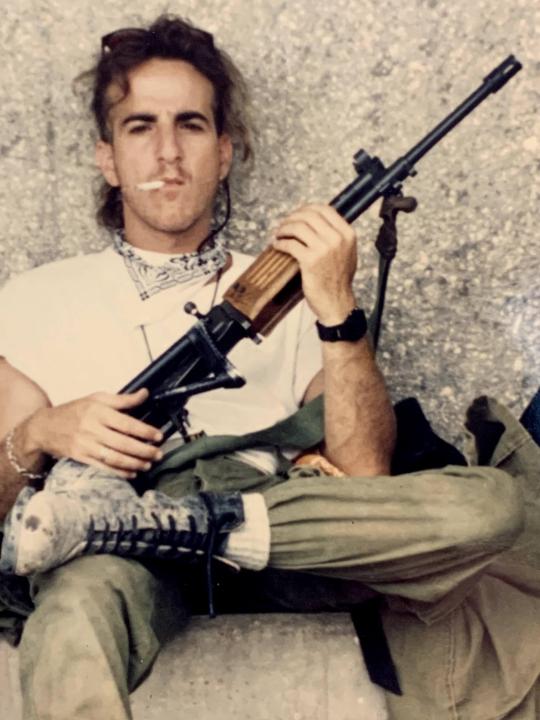#Israel 1991
Explore tagged Tumblr posts
Text


298 notes
·
View notes
Text

🇮🇱 Duo Datz - כאן/Kan
#Duo Datz#Kan#Israel#כאן#Israel eurovision#Israel esc#esc 1991#eurovision 1991#colours looks atrocious on laptop screen but better on phone :I#anyway give it up for one of my all-time faves ❤️
39 notes
·
View notes
Text


15 notes
·
View notes
Text
recommended resources on Lebanese resistance and its context
this has been in my drafts for a long time bc I wanted to find more audio resources but in light of recent events I'm posting as is, and will add more later. pdfs for texts without links can be found on libgen ⭐ = start with these 📺 = video resource 🎧 = audio resource Hizballah ⭐ Lara Deeb, "Hizballah and Its Civilian Constituencies," in The War on Lebanon: A Reader, eds. Nubar Hovsepian and Rashid Khalidi (2007)
⭐🎧 Electronic Intifada Podcast with Rania Khalek, "Why Hizballah would deal Israel a deadly blow" (2024)
⭐🎧 Electronic Intifada Podcast with Amal Saad, "How Hizballah Aims to Deter Israel" (2024)
📺 Rania Khalek, Interview with Hezbollah's Second-in-Command Sheikh Naim Qassem (2023)
🎧 Rania Khalek and Julia Kassem, "The Hybrid War on Lebanon is All About Weakening Hezbollah" (2022)
Hassan Nasrallah, "Voice of Hezbollah: The Statements of Sayyed Hassan Nasrallah," ed. Nicholas Noe (2007)
Judith Harik, "Hizballah's Public and Social Services and Iran," in Distant Relations: Iran and Lebanon in the last 500 years (2006) Sarah Marusek, Faith and Resistance: The Politics of Love and War in Lebanon (2018)
Abed T. Kanaaneh, Understanding Hezbollah: The Hegemony of Resistance (2021)
Karim Makdisi, "The Oct. 8 War: Lebanon's Southern Front" (2024) Political theory ⭐ Ussama Makdisi, "Understanding Sectarianism," in The War on Lebanon: A Reader, eds. Nubar Hovsepian and Rashid Khalidi (2007)
⭐ Rula Juri Abisaab and Malek Abisaab, The Shi'ites of Lebanon: Modernism, Communism, and Hizbullah's Islamists (2014)
Ilham Khuri-Makdisi, The Eastern Mediterranean and the Making of Global Radicalism, 1860-1914 (2010) Tareq Y. Ismael and Jacqueline S. Ismael, The Communist Movement in Syria and Lebanon (1998) 2006 war ⭐ Gilbert Achcar and Michel Warschawski, The 33-Day War: Israel's War on Hezbollah in Lebanon and Its Consequences (2007)
The Electronic Intifada with Dahr Jamail, "The world just sat by" (2006)
The Electronic Intifada with Bilal El-Amine, "Lebanon in Context" (2006) The War on Lebanon: A Reader, eds. Nubar Hovsepian and Rashid Khalidi (2007)
Civil war and 1982 invasion ⭐📺 Up to the South, dir. Jayce Salloum and Walid Ra'ad (1993)
⭐📺 Wild Flowers: Women of South Lebanon, dir. Mai Masri and Jean Khalil Chamoun (1987)
⭐ Souha Bechara, Resistance: My Life for Lebanon (2003)
Jean Said Makdisi, Beirut Fragments: A War Memoir (1990)
Bayan Nuwayhed al-Hout, Sabra and Shatila, September 1982 (2004) Ottoman era Charles Al-Hayek, "How, then, did you try to rebel?"
Lebanon Unsettled, "Lebanon's Popular Uprisings"
Axel Havemann, "The Impact of Peasant Resistance on Nineteenth Century Mount Lebanon," in Peasants and Politics in the Modern Middle East (1991) Ussama Makdisi, The Culture of Sectarianism: Community, History, and Violence in Nineteenth-Century Ottoman Lebanon (2000)
Peter Hill, "How Global was the Age of Revolutions? The Case of Mount Lebanon, 1821" (2020) Mark Farha, "From Anti-imperial Dissent to National Consent: the First World War and the Formation of a Trans-sectarian National Consciousness in Lebanon" (2015) French mandate era ⭐ Kais Firro, Inventing Lebanon: Nationalism and the State Under the Mandate (2002) Sana Tannoury-Karam, "Founding the Lebanese Left: From Colonial Rule to Independence" (2021) Idir Ouahes, Syria and Lebanon Under the French Mandate: Cultural Imperialism and the Workings of Empire (2018)
Malek Abisaab, Militant Women of a Fragile Nation (2009) Misc ⭐📺 Leila and the Wolves, dir. Heiny Srour and Sabah Jabbour (1984)
⭐ Fawwaz Traboulsi, A History of Modern Lebanon (2007)
Karim Makdisi, "Lebanon's October 2019 Uprising" (2021)
2K notes
·
View notes
Video
youtube
#LESEVIDEO →Dauer: 32:59 min #Rabash. Artikel Nr. 2/1991. #Kabbala"←
1 note
·
View note
Text

The Palestinian Prisoner's Society (PPS) reported that since October 7, Israeli authorities have detained 640 Palestinian children from the occupied West Bank.
Currently, about 250 children remain in Israeli prisons, where they reportedly face abuse and torture.
On the first day of the Eid al-Adha holiday, PPS reported that Israeli authorities detained a seven-year-old child, Baha Kazem Haj Mohammed, from the town of al-Mughayyir, east of Ramallah.
According to his family, Baha was detained while at the town centre with other children and youths.
PPS stated that he was beaten on his hands during detention and then released far from his home.
Israel is the only country that systematically prosecutes minors in military courts, which often accept confessions obtained by coercion.
An estimated 500-700 children, some as young as 12, are tried in military courts every year, the most common charge being stone-throwing, which carries a 20-year prison sentence.
Defence for Children International-Palestine (DCIP) also documented the widespread "routine" detainment of child detainees in solitary confinement.
In 1991, Israel ratified the United Nations Convention on the Rights of the Child (CRC) which states that children should only be detained as a last resort.
But a series of policy changes have created loopholes allowing the Israeli authorities to convict children.
#palestine#gaza#free palestine#ceasefire#free gaza#adropofhumanity#israel#usa is a terrorist state#israel is a terrorist state
1K notes
·
View notes
Text
OP deactivated, and some of the links were broken/marked unsafe by Firefox, so here's a new compilation post of Leslie Feinburg's (She/her, ze/hir) novels and essays on being transgender:
Stone Butch Blues official free source directly from Author's website:
Stone Butch Blues, backup on the webarchive:
Transgender Liberation: A movement whose time has come, on the web archive:
Transgender Warriors: Making History from Joan of Arc to Dennis Rodman, on the web archive:
Lavender and Red, PDF essay collection:
Drag King Dreams, on the web archive:
(Also, if anyone ever tells you that the protagonist of Stone Butch Blues ""ends up with a man""........ they're transmisogynistic jackass TERFs who are straight up lying)
Please also check out your local public libraries for these books and see if they carry them, to help support public libraries! If you have a library card already you can checkout Libby and Overdrive to see if your public library carries it as an ebook that you can checkout :)
EDIT: another not included on the orignal masterpost-- Trans Liberation: Beyond Pink or blue !
annnnnd in light of the web archive losing it's court case, here's a backup of both PDFs and generated epubs a friend made:
5/26/2023: hello! I am adding on yet another book of queer history, this time the autobiography of Karl Baer, a Jewish, intersex trans man who was born in 1884! Please signal boost this version, and remember to check the notes whenever this crosses your dash for any new updates :)
6/24/2023:
Two links to share!
Someone made an Epub version of Memoirs of a Man's Maiden Years, which you can find Here , as a more accessible version than a pdf of a scanned book if you're like me and need larger text size for reading--
And from another post I reblogged earlier today, I discovered the existence of "TransSisters: the Journal of Transsexual Feminism", which has 10 issues from 1993-1995, and includes multiple interviews with Leslie Feinburg and other queer feminists / activists of the 90s!
Here's a link to all 10 issues of TransSisters, plus a 1996 "look back at" by one of the writers after the journal ended, you can find all 10 issues on the Internet Archive Here !
------
8/28/2023:
"Bi Any Other Name: Bisexual People Speak Out", can be found on the web archive Here, for the 25th Anniversary Edition from 2015,
and also Here, for the original 1991 version.
Each of the above can be borrowed for one hour at a time as long as a copy is available :D
This is a living post that receives sporadic updates on the original, if you are seeing this on your dash, click Here to see the latest version of the post to make sure you're reblogging the most up to date one :)
------------
October, 25th 2023:
"I began to dawdle over breakfast during shift changes, asking both waitresses questions. After weeks of inquiries, they invited me to a demonstration, outside Kleinhan's Music Hall, protesting the Israeli war against Egypt and Syria. I was particularly interested in that protest. The state of Israel had been declared shortly before my birth. In Hebrew school I was taught "Palestine was a land without peo-ple, for a people without a land." That phrase haunted me as a child. I pictured ears with no one in them, and movies projected on screens in empty theaters. When I checked a map of that region of the Middle East in my school geography textbook, it was labeled Palestine, not Israel. Yet when I asked my grandmother who the Palestinians were, she told me there were no such people. The puzzle had been solved for me in my adolescence. I developed a strong friendship with a Lebanese teenager, who explained to me that the Palestinian people had been driven off their land by Zionist settlers, like the Native peoples in the United States. I studied and thought a great deal about all she told me. From that point on I staunchly opposed Zionist ideology and the occupation of Palestine. So I wanted to go to the protest. However, I feared the demonstration, no matter how justified, would be tainted by anti-Semitism. But I was so angered by the actions of the Israeli government and military, that I went to the event to check it out for myself. That evening, I arrived at Kleinhan's before the protest began. Cops in uniforms and plainclothes surrounded the music hall. I waited impatiently for the protesters to arrive. Suddenly, all the media swarmed down the street. I ran after them. Coming over the hill was a long column of people moving toward Kleinhan's. The woman who led the march and spoke to reporters proudly told them she was Jewish! Others held signs and banners aloft that read: "Arab Land for Arab People!" and "Smash Anti-Semitism!" Now those were two slogans I could get behind! I wanted to know who these people were and where they had been all my life! Hours later I followed the group back to their headquarters. Orange banners tacked up on the walls expressed solidarity with the Attica prisoners and the Vietnamese. One banner particularly haunted me. It read: Stop the War Against Black America, which made me realize that it wasn't just distant wars that needed opposing. Yet although I worked with two members of this organization, I felt nervous that night. These people were communists, Marxists! Yet I found it easy to get into discussions with them. I met waitresses, factory workers, secretaries, and truck drivers. And I decided they were some of the most principled people I had ever met..." Transgender Warriors (1996) Leslie Feinberg
#bold text#large text#transgender#trans#nonbinary#leslie feinberg#neopronouns#activism#no id#pride#essays#Karl bae#memoirs of a man's maiden years#bi any other name
13K notes
·
View notes
Text
Happy Pride month to all Jews and our true allies.
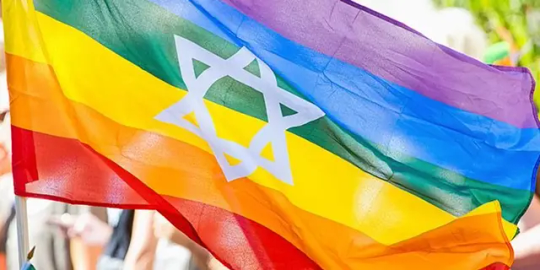
On this occasion, as someone who used to volunteer for the Jerusalem Open House (the gay community center) let me offer you a bit of info about our country's LGBTQ history (and correct some anti-Israel distortions).
This is Chaim (Herman) Cohen.
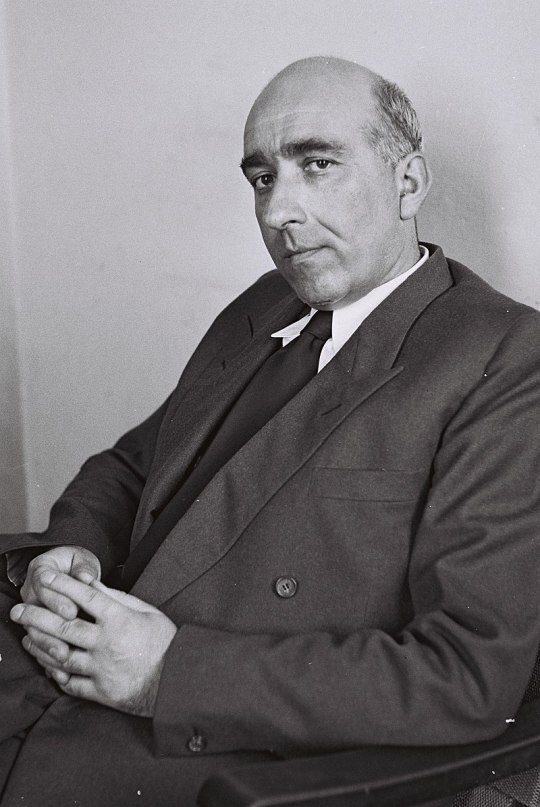
He was born in Germany in 1911, and came to Israel in 1930, to study torah at a yeshiva here. Inspired by his Jewish studies, he decided to turn to the study of law, returning to Germany for that goal and to get married. In 1933, with the rise of the Nazis to power in Germany, he decided to move to Israel permanently. In that sense, he's considered a refugee and Holocaust survivor. His younger brother Leo was murdered by the Nazis.
In 1950, he was appointed Israel's attorney general. In this role, he came across an anti-sodomy law passed by the British Mandate in 1936 (which prohibited all oral and anal sex, including between two men), and which the State of Israel automatically inherited once it was founded in 1948 (source in Hebrew). First he wanted to cancel it, but his jurisdiction fell short of that. As it was within his authority to instruct the Israeli police and state prosecution to ignore it, he did so in 1953. He explained his instruction:
"I thought it was my duty not to uphold a law, which I saw as immoral. [...] And if you should ask, in what is the immorality of the law prohibiting intercourse between men, I will reply to you that such a law against any consenting and private contact between adults contradicts the freedom of man over his own body, and depriving this freedom is a grave infringement against one of the basic human rights."
For comparison's sake, in March 1952, Alan Turing (who saved countless lives for the UK and the allies during WWII) was brought to trial for homosexual consensual private acts, was convicted, and his security clearance was revoked.
In 1978, a special committee of the Knesset (Israel's parliament) recommended several changes to laws addressing various sexual acts, including a recommendation to cancel this anti-sodomy law. In 1980, Israel's first right wing government, under the leadership of Prime Minister Menachem Begin, accepted the committee's recommendations with a corresponding bill (which eventually didn't pass). The bill was presented a second time in 1986, and was passed into law in 1988, decriminalizing same-sex intercourse in Israel (source in Hebrew).
For comparison's sake, in 1990, there were still over 110 jurisdictions in the world criminalizing homosexuality in the world. In the 2020's, RIGHT NOW, there are over 60 that still do.

This is Dr. Doron Maizel (may his memory be a blessing) on the left, with his partner Adir Steiner.
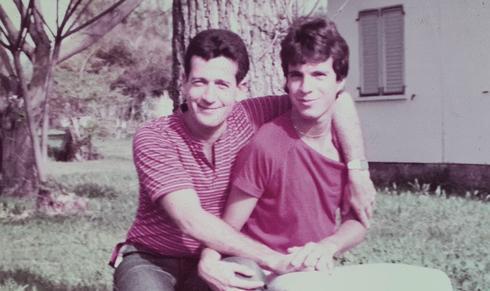
Doron was an army doctor. He was married to a woman with whom he had 3 daughters, before coming out to her in the late 1970's, getting a divorce and eventually openly moving in with his partner Adir. They were together since 1983. Being open about his sexual orientation meant that while Doron was allowed to serve, the same notion that gay men are a security threat (which was applied to Alan Turing), and therefore can't be allowed to serve in top/secret posts in the army, was to stop the promotion that he was about to get. Doron went to visit Ariel Sharon (at the time, Israel's right wing Security Minister, who's in charge of the army) in the latter's private home. IDK what was said in that meeting, but after that, Adir underwent the security check that all partners of a high ranking army officer do, and then Doron got his promotion. When Doron passed away in 1991 from cancer, Adir demanded to be and was recognized as an army widower. Doron's official army commemoration page states, "Left behind a mother, three daughters, a brother and a boyfriend."
Here's Adir with Doron's picture during a 2012 interview:
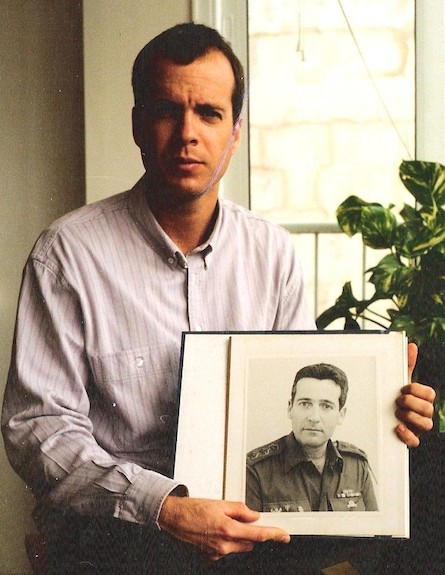
In 1993, the army order that were meant to prevent Doron and other gay soldiers from serving in certain posts was officially canceled. In 1999, a soldier born as male asked to serve as a woman, because that's what she actually was (this would have made this soldier's service shorter, and in that sense "cost" the army). The request was accepted, and since then, trans soldiers serve in the gender they identify with.
The story of Israel's LGBTQ rights isn't only glitter and fairies. Just like I can talk about a lot of progress that the state made in equalizing our rights in many domains (because I have), I could also talk about the rights we still don't have (because I've done that, too). The situation here isn't perfect (though as far as I'm aware, it isn't anywhere in the world, there are at least a few rights denied to the queer community in every country I know of). But when I look at our history, I feel like Israel isn't just one of the more queer-friendly countries in the world, it was also at certain moments at the very forefront of the struggle to recognizing queer people as deserving of equal treatment.
Which is maybe the most instinctual reason for my fury at the form of the Israel's demonization using the false notion of "pink washing." It is DERANGED to think Chaim Cohen, in 1953, gave his pro-gay instruction in relation to an occupation that Israel wasn't being blamed of until after the Six Day War in 1967, and which didn't gain attention from the regular people (as opposed to foreign politicians, who didn't give a shit about Israel's record on gay rights) until the Derben Conference in 2000. Not to mention how the idea that having a good gay rights record is something a country can brag about is probably even younger than that conference.
The pink washing accusation is de-humanizing. It suggests that it can't be that Israelis simply have a set of values which happens to align with the west's when it comes to the gay community (or women's rights, or ecological awareness, or freedom of speech, or any of the other positives Israel has, which position it high in the Freedom Index, and which anti-Israel activists label "washing" with one color or another). No, the history of these fields in the Jewish state is all about what non-Jews will say about us! It's like you can't fathom that we have an existence of our own, and minds of our own, and desires and wants and struggles of our own, and not everything is centered about what you think of us.
And the source of this self-centered thinking seems to connect with an inability to accept the Jewish state as anything other than the ultimate evil. Because Israel has to be the supervillain of the story, then it can't have a single positive. Everything about it has to be black, otherwise that challenges the black and white narrative that's been developed to demonize the Jewish state. So if it is revealed that there's any domain in which Israel is actually doing good things, reflecting a respect for human rights or a closeness to the values that the anti-Israel crowd claims to uphold, then it must be just a cover up for how Israel treats the Palestinians.
Essentially, the pink/purple/green/whatever washing accusations are as insane and antisemitic, just like claiming that Jews have won so many Nobel Prizes (a reflection of how much our people have benefited humanity) to distract the world from all the non-Jewish kids we kill to use their blood to bake Passover matzos.
But it's actually worse. Because in the process of demonizing Israel, Israeli Arab and Palestinian queers get thrown under the bus, too. As a gay activist, I'm familiar with so many gay and trans Israeli Arabs who get to have a good life thanks to Israel's good gay rights record, who are aware that if the anti-Israel crowd is successful in de-legitimizing and destroying this state, they're fucked as well. I know a lot of gay and trans Palestinians, who only catch a break when they come to the Jerusalem Open House, or generally to Israel, the only place where they can be themselves safely. I know so many queer Palestinians who are scared for their lives because of the violent intolerance of their own families, society and governments. And all the western countries from which the anti-Israel people come from refuse them entry as refugees persecuted for their sexual orientation (yes, I have gay Palestinian friends who have tried, only to be turned down by country after country, no matter how "liberal" or "pro-Palestinian" they officially claim to be).
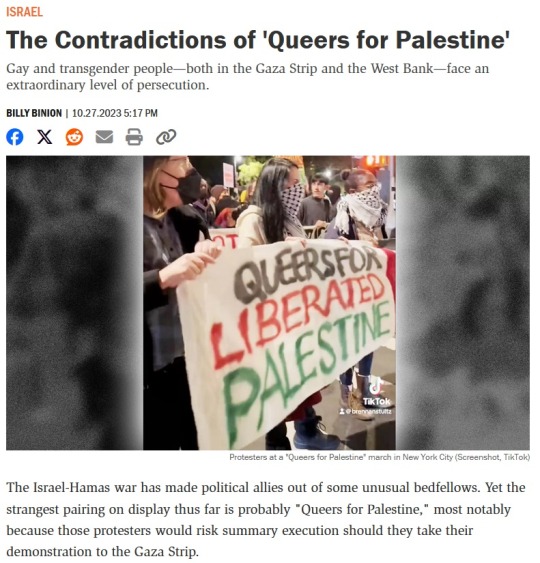
Meanwhile, gay Palestinians can get temporary asylum in Israel (please don't tell me it's "pink washing" again, when no one from the anti-Israel crowd will even acknowledge this fact) if they fear for their lives, it's just not a proper solution, because just like Palestinian terrorists can get into Israel, carry out an attack and murder innocent civilians, Palestinian homophobes can get inside as well, and murder the queer people who had fled here.
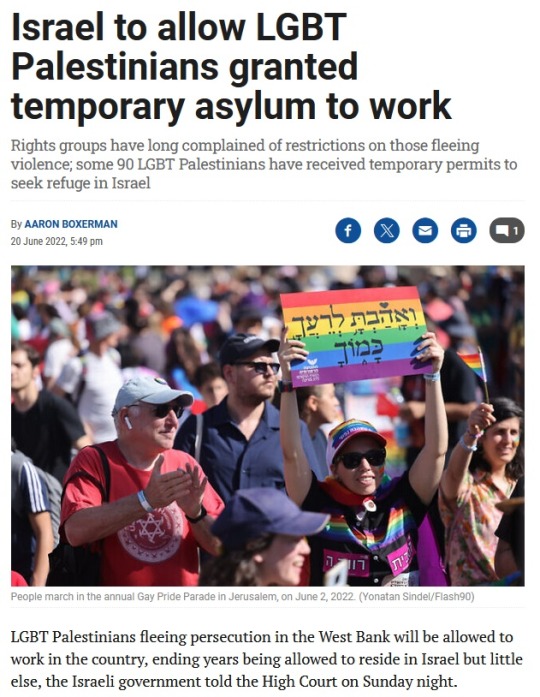
And just to make reality a tad more complex, you know how for the anti-Israel crowd, the worst of the worst of Israeli society, are the religious ("Fanatic! Extremist! Violent!") settlers? I know of more than one case where those religious settlers are the ones who are helping gay Palestinians, but here's one that made it into the Israeli news.

Life is just not black and white, human nature is complex, Israel is a country where human beings are more than just their stance on the conflict and whether foreigners agree with it or not, and the "pink washing accusation" black and white washes all our colors away, trying to reduce us into caricatures that fit into their simplistic, reductive narrative, so they can go on playing "white/western/outsider savior" to the "poor Palestinians" without actually caring about many of the poorest, most marginalized ones.
This vid isn't a representation of all gay Israeli Arabs, but it's def a voice you will not see acknowledged on the anti-Israel side:
Happy Pride to everyone seeing us, all of us, Israelis and Palestinians, queer and straight, with all of our humanity and complexity!
(for all of my updates and ask replies regarding Israel, click here)
#israel#israeli#israel news#israel under attack#israel under fire#israelunderattack#terrorism#anti terrorism#antisemitism#hamas#antisemitic#antisemites#jews#jew#judaism#jumblr#frumblr#jewish
350 notes
·
View notes
Text
In all, at least 100 people set themselves on fire in the US and Vietnam to protest the war. After a long history on multiple continents as a tool of protest against religious persecution—the precedent on which Quảng Đức was drawing—these self-immolations cemented a new association in American culture between the tactic and anti-war activism. In February 1991, during the first US war in Iraq, Gregory Levey doused himself in paint thinner and perished in a fireball in a park in Amherst, Massachusetts, leaving behind a small cardboard sign that read, simply, “peace.” Malachi Ritscher, an experimental musician in Chicago, set himself on fire on the side of the Kennedy expressway during the morning rush hour one Friday in November 2006, after posting a long statement on his website explaining that he felt there was no other way for him to escape complicity with the “barbaric war” the US was then waging. He had been arrested at two previous anti-war protests. Scholars often associate the rise of political self-immolation in the 1960s with the rise of television: a spectacular form of protest for the society of the spectacle. But of course there are less painful ways for protestors to attract eyeballs. The reality is that self-immolation registers the near-total impotence of protest—and even public opinion as such—in the face of a military apparatus completely insulated from external accountability. It the rawest testament to the absence of effective courses of action. When war consists primarily of unelected men in undisclosed locations pouring fire on the heads of people we will never know on the other side of the world, there is very little that ordinary people can do to arrest its progress. But we still have our bodies, and it is in the nature of fire to refuse containment. To ask whether self-immolation is good or bad, justifiable or non-justifiable, effective or ineffective is in large part to miss the point, which is that it is an option, whether anyone else likes it or not. It illuminates our powerlessness in negative space, but it also affirms the irreducible core of our freedom, that small flame of agency that no repression can extinguish. Since Aaron Bushnell’s death by self-immolation this week in protest of Israel’s genocide in Gaza, his detractors have warned about the risk of “contagion,” suggesting that his protest will encourage imitators (who, they imply, share his alleged mental instability). There may or may not be additional self-immolators before the slaughter comes to an end, just as Bushnell was preceded by a woman, yet to be identified publicly, who burned herself outside the Israeli consulate in Atlanta in December. But the purpose of lighting yourself on fire is not to encourage other people to light themselves on fire. It is to scream to the world that you could find no alternative, and in that respect it is a challenge to the rest of us to prove with our own freedom that there are other ways to meaningfully resist a society whose cruelty has become intolerable.
330 notes
·
View notes
Text
🟡 I CASI DELLA VITA
- John Jacob Astor (l'uomo più ricco del mondo nel 1912).
Ebbe serie divergenze con la famiglia Rothschild. Affondò col Titanic.
- Robert Maxwell (magnate dell'editoria negli anni '70 e '80).
Aveva truffato le banche e la grande finanza anglosionista. Prima morì, e poi cadde in mare dal suo Yacht nel 1991.
- Mike Lynch, (miliardario del settore cybersecurity) fu accusato di avere truffato 8 mld. alla grande finanza anglosionista. Fu assolto, ma affondò, assieme al suo avvocato, in circostanze inspiegabili col suo veliero Bayesian nel 2024.
- Elon Musk (l'uomo più ricco del mondo). Ebbe un problema politico col movimento sionista per un tweet incauto. Lo cancellò, chiese scusa, andò in Israele a piangere sul muro e ad abbracciare Netanyahu. È ancora l'uomo più ricco del mondo.
La sfortuna bisogna saperla evitare ...
Massimo Montanari
86 notes
·
View notes
Note
How can you support Palestine? It’s constantly ranked as one of the worst countries for lgbt rights/safety and people who are found out face death in many instances. A man was decapitated in the street for being found gay and gay sexual relations are illegal with a penalty of jail time… Who do you think you are crusading for? The reality is if you went there with a rainbow flag walking down the street you would not be ok. Queer people flee to Israel for safety because society there as in many Islamic regions is notoriously anti-lgbt. Israel bought their land and have every right to defend themselves contrary to what the people wanting to wipe out their entire country believe
Hello!
I support Palestine because every person has a right to live. Because what is happening is a genocide. It's a fact. You can argue about it to the kingdom come, but it's done by the book genocide and, since it's a fact, opinions can't change it.
With this being said, I'd like to address two specific points you made.
You can't shame me - or anyone who is queer and supports Palestine - by talking about hate crimes against queer people or describing them. Because before that you should look at your own country and check when was the last time a hate crime happened. I bet it'll be recent. Hate crimes and homophobia are not exclusive to arabic/muslim countries. This point of view is narrow minded at best and racist at worst - either by the lack of education or lack of interest in the world.
"The reality is if you went there with a rainbow flag walking down the street you would not be ok." - At this point I thought you might be a troll because saying this to me? I really am the wrong person to come to with this. I live in Russia. It's illegal to wear rainbow flags here and you will go to jail for it. Chechnya has torture camps for gay men. There's police raids in gay bars in Moscow happening regularly. Trans people are in danger of being forced to detransition. I live in the scenario above, you don't need to scare me with it out of supporting Palestine.
But my point is - I support Palestine as a queer even more as just a human, because I know what it means to live like this. Just because Palestinian queers might not be all loud and proud doesn't mean they don't exist; just because being gay is condemned and puts one's life at risk doesn't mean queers just suddenly stop existing.
And I also know - just as I have support here (my closest friends are straight women with traditional beliefs and they are very comfortable with me being gay, most people I know are not violently homophobic) Palestinian queers have their support, their communities and their people who love them and care for them. And they need our support as well. We don't get to turn our back on our fellow queers just because they happen to live in unsafe places. (and again, this kind of belief stinks of racism or of the need to broaden your worldview horizons. Believe me, the majority of queers are not white and don't live in lgbt-friendly countries)
"Israel bought their land and have every right to defend themselves contrary to what the people wanting to wipe out their entire country believe." My point in this is also really affected by me being Russian. (I'm sorry if some of you are uncomfortable with it, I can't really change it.)
You see, these reasons are very similar to what I've heard when Putin tried to justify the attack on Ukraine.
"Israel bought their land" is just as disgusting to me as "Ukraine didn't exist until 1991". "Israel has every right to defend themselves" is Putin's "We're defending ourselves against the collective West". Which is fucking nonsense.
And this is done by the book propaganda - and I'm not saying this because propaganda is a big word people like to throw around. I know this because I studied propaganda for my bachelor degree as a part of "changing public's opinion" course - me and my classmates were trained in this. They take some historical facts you can't deny or make an enemy out of someone (them vs us) and manipulate it to fit their rhetoric. Once you know how to recognise it you'll never not recognise it again.
Israel is not defending itself by targeting civilians and sniping children - they killed more children in these months than Russia in two years which is horrifying to me - they confirmed multiple times they want to erase Palestine from the face of the Earth. These words don't mean self-defence. It's a colonial power that really wants to show how powerful they are and how unstoppable they are. And again, I know this from the side of the colonial power. For me, people who side with Israel are the same people who side with Russia - and it makes me sick.
Also please don’t assume that people who support Palestine want to destroy Israel, this is again, very narrow minded. Saving people from genocide by committing another genocide? This is plainly stupid. The world is not black and white, it's more complicated than just taking sides. I'll give an example: I'm queer and I know I'll be in danger if I ever come to Dagestan (close to Chechnya) - but dagestan people fund rise to send humanitarian aid to Palestine and I donate to them, because people are dying and I don't really care if people who'll help them are homophobic to me. Because it's not about me.
But there are moments in history when you need to take a stand, and I will not stand with Israel. (or Russia for that matter)
Anyway. Stand with Ukraine. Free Palestine.
#palestine#free palestine#abby anderson x reader#don't come to me with the same points all zionists have; I've heard way worse said to my face irl#and especially don't weave queer safety into it
123 notes
·
View notes
Text
On this day in history, the Jews of Romania were forced to wear yellow stars and special hats, to identify them as Jews.
This Nazi practice was borrowed from Islam, which forced Jews in Islamic conquered countries, to wear special identifying clothing, and other horrific antisemitic apartheid rules, which always led to ethnic cleansing and genocide.
After Muslims invaded and colonized Israel and Spain, they made this the law of the land:
"o11.0 NON-MUSLIM SUBJECTS OF THE ISLAMIC STATE (AHL AL-DHIMMA)
...o11.5 Such non-Muslim subjects are obliged to comply with Islamic rules that pertain to the safety and indemnity of life, reputation, and property.
(1) Are penalized for committing adultery or theft, though not for drunkeness;
(2) Are distinguished from Muslims in dress, wearing a wide cloth belt (zunnar);
(3) Are not greeted with “as-Salamu ‘alaykum”;
(4) Must keep to the side of the street;
(5) May not build higher than or as high as the Muslims’ buildings, though if they acquire a tall house, it is not razed;
(6) Are forbidden to openly display wine or pork, (A: to ring church bells or display crosses,) recite the Torah or Evangel aloud, or make public display of their funerals and feastdays;
(7) And are forbidden to build new churches.
o11.10 The agreement is also violated [when the non-Muslim]
(5) Or mentions something impermissible about Allah, the Prophet (Allah bless him and give him peace), or Islam.
o11.11 When a subject’s agreement with the state has been violated, the caliph chooses between the four alternatives mentioned above in connection with prisoners of war (o9.14)."
[death, slavery, ransom or release]
Source: “Reliance of the Traveller a classic manual of Islamic sacred law”, 1991 revised edition in English

#islamism#islamic jihad#israel#secular-jew#jewish#judaism#israeli#jerusalem#diaspora#secular jew#secularjew#islam#Quran#jizzyah#Muslim tax#Islamic colonization#colonizers
66 notes
·
View notes
Text
How many times did we get an offer to split the land with the Jews?
1. Peel Commission (1937): This was the first major proposal for partition by the British, recommending a division of Palestine into separate Jewish and Arab states. The plan proposed a small Jewish state in>
parts of the north and coastal areas, with the remainder of the land going to the Arabs. The Jewish leadership accepted it in principle but wanted modifications, while the Arabs outright rejected it.
2. United Nations Partition Plan (1947): Known as UN Resolution 181, this> was the most significant partition plan prior to the establishment of the State of Israel. The plan proposed the creation of independent Jewish and Arab states, with Jerusalem as an international city. The Jewish community accepted the plan, but the Arab leadership rejected it,> leading to the 1947–1948 Civil War and the subsequent Arab-Israeli War of 1948.
3. Armistice Agreements (1949): After the 1948 Arab-Israeli War, armistice agreements were signed between Israel and its neighboring Arab states, but these did not constitute a formal partition plan>
Instead, they established ceasefire lines, known as the Green Line, without official recognition of borders.
4. Rogers Plan (1969): Proposed by U.S. Secretary of State William P. Rogers, the Rogers Plan aimed at resolving the Israeli-Arab conflict after the 1967 Six-Day War.>
The plan called for Israeli withdrawal from territories occupied in the war (including the West Bank, Gaza, and East Jerusalem) in exchange for peace and recognition by Arab states.
Impact: The plan was rejected by both Israel and the Arab states, as Israel was unwilling to>
the pre-1967 borders, and the Arab states refused to recognize Israel or negotiate at that time.
5. Camp David Accords (1978): The Camp David Accords were brokered by U.S. President Jimmy Carter between Egyptian President Anwar Sadat and Israeli Prime Minister Menachem Begin.>
Two frameworks were agreed upon: A. Framework for Peace in the Middle East B. Egypt-Israel Peace Treaty (1979) Impact: The accords improved relations between Israel and Egypt but did not resolve the broader Israeli-Palestinian conflict, nor did they lead to immediate Palestinian> autonomy.
6. Madrid Conference (1991): After the Gulf War, the U.S. and the Soviet Union co-sponsored the Madrid Peace Conference, bringing Israel and Arab states (including Palestinian representatives) to the negotiating table for the first time.
Impact: The conference> initiated direct, face-to-face negotiations but did not result in a final agreement. However, it paved the way for later agreements, including the Oslo Accords.
7. Oslo Accords (1993-1995): The Oslo Accords were the first direct agreement between Israel and the Palestine>
Liberation Organization (PLO). The accords outlined a framework for Palestinian self-governance in parts of the West Bank and Gaza and a five-year timeline for further negotiations on issues like borders, refugees, and Jerusalem. Impact: The Oslo Accords led to the establishment>
of the Palestinian Authority and the division of the West Bank into Areas A, B, and C, each with varying levels of Palestinian and Israeli control. However, final status issues were left unresolved, and subsequent violence, including the Second Intifada (2000-2005), disrupted> the peace process.
8. Camp David Summit (2000): U.S. President Bill Clinton hosted Israeli Prime Minister Ehud Barak and Palestinian leader Yasser Arafat at Camp David to negotiate a final status agreement. Barak offered a two-state solution, proposing that Israel would>
withdraw from most of the West Bank and Gaza, while retaining some settlement blocs and offering a shared Jerusalem. Arafat rejected the offer.
Impact: The failure of the summit, combined with the outbreak of the Second Intifada, led to a collapse in the peace process.>
9. Taba Summit (2001): Following the Camp David failure, Israeli and Palestinian negotiators met in Taba, Egypt, to try to salvage the peace process. The talks made significant progress, with Israel offering a near-complete withdrawal from the West Bank and Gaza and compromises>
on Jerusalem. However, the negotiations were interrupted by Israeli elections and the Second Intifada.
Impact: While progress was made, the talks ended without a final agreement, and violence escalated soon after.>
10. Annapolis Conference (2007): The Annapolis Conference, held in November 2007 in Annapolis, Maryland, was a peace summit aimed at resolving the Israeli-Palestinian conflict and promoting the two-state solution. It was initiated by U.S. President George W. Bush and attended by>
Israeli Prime Minister Ehud Olmert, Palestinian Authority President Mahmoud Abbas, and representatives from several other nations. The conference sought to revive peace negotiations based on previous agreements, with the goal of establishing an independent Palestinian state>
alongside Israel. During the negotiations, Olmert made a far-reaching peace proposal to Abbas, offering a near-total Israeli withdrawal from the West Bank, a territorial link to Gaza, and international control of Jerusalem's Old City. Abbas, however, rejected the offer.>
11. Trump Administration Peace Plan ("Deal of the Century") (2020): The Trump administration proposed a peace plan in January 2020, which envisioned a two-state solution, with Israel retaining large portions of the West Bank, including settlement blocs, while offering the>
Palestinians limited autonomy over a non-contiguous state. Jerusalem would remain Israel's capital, and the Palestinians would receive some compensation for land losses.
Impact: The plan was welcomed by Israel but rejected outright by the Palestinian leadership.
Ahmed Al-Khalidi
32 notes
·
View notes
Text
Have You Ever Heard of the "Samson Policy?"
The Samson Policy Explained: 👇
The Samson Policy, also known as the "Samson Option," refers to Israel's nuclear deterrence strategy of massive retaliation with nuclear weapons as a "last resort" against a country whose military has invaded and/or destroyed much of Israel. This policy is named after the biblical figure Samson, who pushed apart the pillars of a Philistine temple, bringing down the roof and killing himself and thousands of Philistines who had captured him.
According to various sources, including Seymour Hersh's 1991 book "The Samson Option: Israel's Nuclear Arsenal and American Foreign Policy," Israel's nuclear strategy involves maintaining a policy of deliberate ambiguity, refusing to confirm or deny the existence of its nuclear weapons or to describe how they would be used. This ambiguity is intended to increase the effectiveness of deterrence by leaving potential adversaries uncertain about the consequences of attacking Israel.
The policy is often associated with the concept of "nuclear opacity," which means that Israel's nuclear capabilities are not openly disclosed, making it difficult for others to assess its nuclear posture. This opacity is seen as a key component of Israel's deterrence strategy, as it creates uncertainty and makes it harder for potential adversaries to calculate the risks and benefits of attacking Israel.
Key aspects of the Samson Policy: 👇
1. Massive retaliation: Israel's nuclear response would be proportionally massive in scale, intended to inflict devastating damage on the aggressor.
2. Last resort: The Samson Policy is only triggered as a last resort, when Israel's very existence is threatened.
3. Ambiguity: Israel maintains a policy of deliberate ambiguity regarding its nuclear weapons, refusing to confirm or deny their existence or describe how they would be used.
4. Nuclear opacity: Israel's nuclear capabilities are not openly disclosed, creating uncertainty and making it harder for potential adversaries to assess its nuclear posture.
Overall, the Samson Policy represents Israel's commitment to defending its sovereignty and territorial integrity through a robust nuclear deterrence strategy, while maintaining a level of ambiguity and opacity to maximize its effectiveness.
Did You Know? 🤔
#pay attention#educate yourselves#educate yourself#knowledge is power#reeducate yourselves#reeducate yourself#think about it#think for yourselves#think for yourself#do your homework#do your research#do some research#do your own research#ask yourself questions#question everything#sampson policy#did you know#you decide#news#new info#israel
24 notes
·
View notes
Text
Brazil ratifies free trade agreement with Palestinian Authority
Brazilian President Lula da Silva has been outspoken in criticism of Israel's genocide of Palestinians

In a show of solidarity with Palestine, Brazil ratified a free trade agreement with the Palestinian Authority (PA) signed over a decade ago, Reuters reported on 9 July.
“The agreement is a concrete contribution to an economically viable Palestinian state, which can live peacefully and harmoniously with its neighbors,” Brazil’s foreign ministry said on Monday in a statement.
Brazil officially recognized Palestine as a state in 2010 and allowed the PA to build an embassy in Brasilia, the country’s capital.
The agreement, ratified Friday, was first signed between the Mercosur trade bloc of South America and the PA in 2011. The free-trade bloc was created in 1991 and consists of Brazil, Argentina, Paraguay and Uruguay.
Continue reading.
#brazil#brazilian politics#politics#palestine#israel#palestinian politics#economy#foreign policy#international politics#image description in alt#mod nise da silveira
36 notes
·
View notes
